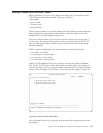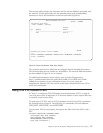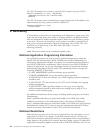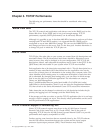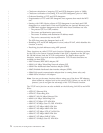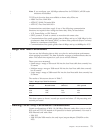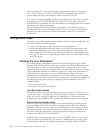
Chapter 3. TCP/IP Performance
The following are performance items that should be considered when using
TCP/IP.
*BASE Pool Size
The TCP/IP protocol and application code always runs in the *BASE pool on the
iSeries 400 server. If the *BASE pool is not given enough storage, TCP/IP
performance, especially SMTP performance, can be adversely affected.
Although it is possible to run in less than 4000 KB of storage to perform well when
running both FTP and SMTP sessions, it is suggested that the *BASE pool be
configured to use at least 4000 KB of storage. You can use the WRKSYSSTS to view
and change pool sizes on the server. Pool 2 is the base pool. Another alternative is
to change the pool in which the TCP/IP jobs run.
TCP/IP Jobs
TCP/IP jobs, like other jobs on your system, are created from job descriptions and
associated classes. The job descriptions and classes should be adequate in most
cases; however, they may be changed to fit your configuration. The TCP/IP job
descriptions, classes, and subsystem descriptions can be found in the QTCP or the
QSYS library that was loaded in your system when TCP/IP was installed.
Each application has a job description associated with it. This job description has a
number of items associated with it that define how the application runs on the
server. One of these pieces of information is the routing entry compare value. This
value identifies which routing entry in a subsystem description is used when this
job is submitted. By changing that routing entry, you can select in which storage
pool to run the jobs for a particular application. For information on compare
values, see Work Management
(http://publib.boulder.ibm.com/pubs/html/as400/v5r1/ic2924/info/rzaks/
rzaks1.htm) in the Information Center. If you are using the Supplemental Manuals
CD, then switch to the iSeries Information Center CD to access this information.
Other items that can be changed or selected on a job description include the job
priority, the logging level for messages, and the initial library list.
If the storage pool that you select to run the TCP/IP application jobs in is not large
enough, excessive paging can occur. This directly affects performance on the server
and the performance of the applications.
TCP/IP Protocol Support Provided by IOP
iSeries TCP/IP protocol support runs down in the AS/400 System Licensed
Internal Code, at the same level as LU 6.2 and APPN*. One of the goals of
integrating TCP/IP into the AS/400 System Licensed Internal Code is to provide
performance and capacity comparable to APPC.
Further, moving some functions that are normally done by the TCP/IP software
into the IOP reduces interactions between the system and the input/output
processor (input-output processor (IOP)). These functions may include:
© Copyright IBM Corp. 1997, 2001 71
|
|
|





